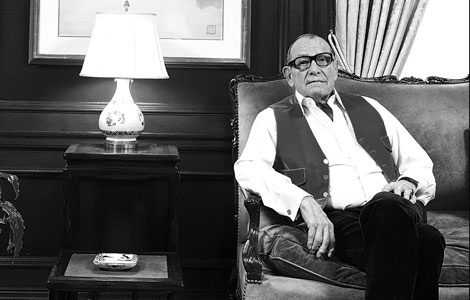More steely resolve for judicial reform
Updated: 2015-03-13 10:23
(China Daily)
|
||||||||
|
China's Chief Justice Zhou Qiang delivers the work report of the Supreme People's Court (SPC) to the national legislature at the ongoing annual session. [Photo/IC] |
The Supreme People's Procuratorate and Supreme People's Court may get better-looking ratings this year when their work reports are presented for voting at the National People's Congress, as each has something impressive to report.
Most noticeably, the former investigated more than 14,000 public servants for bribe-taking, the latter corrected more than 1,300 court rulings through retrials, including several sensational miscarriages of justice.
These are certainly signs of progress. And they will surely add to public confidence in the rhetoric about the rule of law.
But the road to the kind of justice President Xi Jinping wants people to feel "in every case" remains long and tortuous, not least because these were not achieved on their own initiative. In a certain sense, they were natural by-products of the rectification campaign that is sweeping public offices.
Not that there was no progress on the judicial front. The idea of selling "assumption of innocence" to a broader audience inside the judicial system, for one, was a laudable endeavor to update the judicial way of thinking, particularly at the grassroots.
So the judicial sectors should concentrate on creating something truly impressive of their own making this year, and in the years to come. Whether or not they can make that happen, however, rests entirely on their ability to guarantee the latest judicial reform blueprint is executed as it is supposed to be.
For average citizens, having justice done, especially when a dispute involves a public office or official, can be a costly mission. The rule of law remains a mere ear-pleasing slogan because public office-holders continue to take the law as a tool to suit themselves.
In real life, the procuratorate and court are treated as just two other departments of the government. Prosecutors and judges, therefore, are taken as just bureaucrats on budget payroll. They depend on local administrators for normal functioning. There is no way they are not vulnerable to administrative intervention.
But ordinary people simply want the judicial system to be fair and just.
Many of the pilot projects on the judiciary's agendas promise to deliver substantial differences. The establishment of circuit courts, as well as the "de-bureaucratization" of judges, will all contribute to the judiciary's struggle to get rid of the current credibility crisis.
The key to success, however, lies in making sure every step forward is solid and down-to-earth.

 Picturesque scenery of red earth in Yunnan
Picturesque scenery of red earth in Yunnan
 Across Canada March 13
Across Canada March 13
 Night life with a difference
Night life with a difference
 Top 8 symptoms of being a smartphone addict
Top 8 symptoms of being a smartphone addict
 Christie's to auction landmark Chinese collection
Christie's to auction landmark Chinese collection
 Chinese manufacturers keeping Apple Watch ticking
Chinese manufacturers keeping Apple Watch ticking
 Hutong culture captured on porcelain plates
Hutong culture captured on porcelain plates
 Foreigners at the 'two sessions' over the years
Foreigners at the 'two sessions' over the years
Most Viewed
Editor's Picks

|

|

|

|

|

|
Today's Top News
Nation open to US pivot
Small Chinese firms discovering OTCBB market
Tencent, US firm join on e-books
Strong US dollar impacts world trade
Two officers shot outside Ferguson police HQ
Clinton brings Benghazi panel back in spotlight
Prudent monetary policy continues
Reproach for wrongful convictions
US Weekly

|

|







